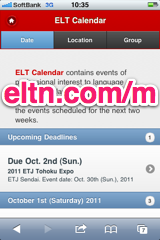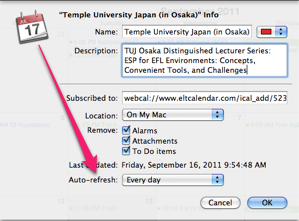Fukuoka JALT:
Two Presentations by Terry Fellner
Date: Saturday, May 19th, 2007 Time: 6:30 PM - 8:30 PM
Speaker: Terry Fellner, Saga University
Description:
Presentation 1: Developing Writing Fluency Through Blogs.
This presentation will examine the use of student blogs to improve writing fluency among Japanese students studying English at a Japanese university during the summers of 2004, 2005, and 2006. In each year, a group of fourth year foreign language majors participated in a seven-day integrated CALL program. All three programs included a variety of F2F tasks and computer based tasks, integrated into a blended learning environment with blogs as the main writing task. All the students involved were considered to have low English proficiency and low motivation.
The presenter will first outline the integrated program and describe in what context student blogs were used. Fellner will then briefly discuss the seven criteria for CALL task selection (Fellner & Apple, 2006a). Following this, the presenter will introduce their definition of writing fluency (Fellner & Apple, 2006b), which was used as a basis for measuring learner gains in writing fluency. By comparing the number of words and word frequency levels in student blogs at the beginning and end of each program a significant improvement in writing fluency was observed. The first day of each intensive course saw students write blog entries consisting of low word counts and utilizing lexical items falling in the most frequent 1000 word level. However, by the end of all three seven-day intensive courses the researchers found that overall word counts increased by an average of over 300 per cent. In addition, there was a substantial increase in the number of 2000 word level items. As a result they are able to conclude that writing fluency was enhanced through the use of blogs.
Presentation 2: Outdoor Language Learning: Taking Learning Beyond The Classroom.
This presentation attempts to explain and justify the use of a new methodology the author refers to as Outdoor Language Learning (OLL) as a useful and beneficial way of enhancing English language learning in both second language (ESL) and foreign language (EFL) situations. The presenter will first explain what is meant by the term Outdoor Language Learning and then describe the theoretical background which supports its implementation in formal education. The presentation will then illustrate that teachers can obtain 10 benefits from using OLL which they should consider in order to enhance their language teaching experiences. Following this the presenter will detail some practical considerations educators must take into account when they are preparing an OLL program for their students. The presentation concludes by proposing that outdoor language learning, while suitable for all language learning situations, may hold particular promise for those contexts which occur in developing countries.
About the speaker: Terry Fellner is an Associate Professor at Saga University in Japan. He has been a language teacher and teacher trainer for over 15 years in North America, Africa and Asia. His current interests lie in the areas of CALL, Outdoor Language Learning, academic writing, and curriculum and materials design.
Organization: Fukuoka Chapter of the Japan Association for Language Teaching (Fukuoka JALT)
Cost: JALT Members: free
Non-members: 1,000 yen
Venue: Fukuoka Jo Gakuin Tenjin Satellite Campus (9F), Tenjin 2-8-38, Chuo-ku, Fukuoka-shi map
Location: Fukuoka City, Fukuoka Prefecture, Japan
![]() Add this to iCal
Add this to iCal
![]() (Need help?)
(Need help?)
![]() Add to Outlook
Add to Outlook
![]() (Need help?)
(Need help?)
Contact Fukuoka JALT
Website: fukuoka.jalt.org
Email QR Code:








